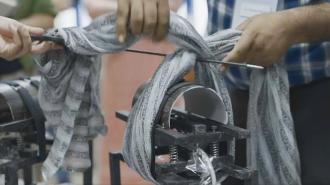Globally, there is a massive shortage of surgeons, especially in low-resource countries. The result: every year around the world, an estimated 17 million people die because they lack access to surgery. This number is more than five times higher than the combined number of people who die annually from HIV, tuberculosis, and malaria.
To many people, this problem might seem overwhelming. Not to Catherine Mohr, the president of the Intuitive Foundation. She sees the problem in terms of systems—“big, messy systems that have fixable flaws” and sees herself as a “system optimizer.” Mohr and the Foundation are now working to do just that by changing the current process of training surgeons.
The Intuitive Foundation, a philanthropic organization whose aim is to reduce the global burden of disease, is fostering new approaches that have the potential to significantly increase the number of health care workers who can perform surgery OR provide acute care. The goal: create scalable systems that help governments and institutions in these countries rapidly expand the ranks of potential surgeons. Some of these approaches are already being rolled out around the world.
Watch our video on The Intuitive Foundation:
Formed in 2018, the Foundation is an independent 501(c)(3) charitable organization supported by pioneering robotic surgery company Intuitive. The company, based in Sunnyvale, California, produces innovative minimally invasive robotic surgical systems that have been used in more than 12 million surgical procedures over the past 25 years.
According to a 2008 study in the Lancet, the poorest third of the world’s population receives only 3.5 percent of all surgical procedures. In many parts of Africa, rural India, and South America, there is a severe shortage of trained surgeons; in these places, procedures that are routine in most of North America and Europe are often beyond reach for millions of people. According to a 2015 World Bank report, about two billion people lack access to surgical services such as Cesarean sections or setting broken bones.
The global surgical training challenge
Three years ago, to help solve this issue, the Foundation launched the Global Surgical Training Challenge, which aims to develop new strategies that will allow health care workers to safely add new surgical skills relatively quickly. The goal is to find workable ways to rapidly expand the ranks of potential surgeons in low-resource settings.
The recently completed competition started with 42 teams from 44 countries. Earlier this year, the Foundation announced the winner, awarding $700,000 to an Ethiopia-based group of researchers that built surgical self-training modules for health care workers in resource-limited regions to help them learn to perform minimally invasive surgeries of the abdomen and pelvis. A Nigeria-based team was the runner-up, winning $300,000 to continue its work using 3D printing to teach essential fracture management.
“The goal that we are working towards is a blooming ecosystem in which anyone can come in and learn how to do the procedures that are necessary to save or improve the lives of the people in the community that they live in,” Dr. Mohr says.
Beyond access to surgery, the Foundation is working to improve health, and health equity, in other ways. In the U.S., it is helping to address the leaky pipeline of women and underrepresented minorities in STEM and healthcare. Some of these programs help middle and high school students from low-income, underrepresented communities get better access to STEM education, increasing their chances of pursuing these careers in college and beyond. One of the programs—seen in the video—is the NC-MSEN Pre-College Program, based in North Carolina, which allows students in grades 6-12 to attend classes on the campus of North Carolina State University campus.
Sherice Morris, an Intuitive employee who lives in North Carolina and has served on Foundation committees, is excited by what it can accomplish: “This mission, of getting more underserved communities involved in STEM and in health care, is only going to make our world better.”






